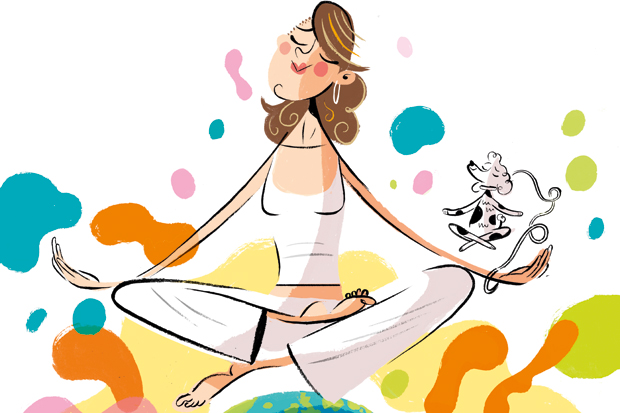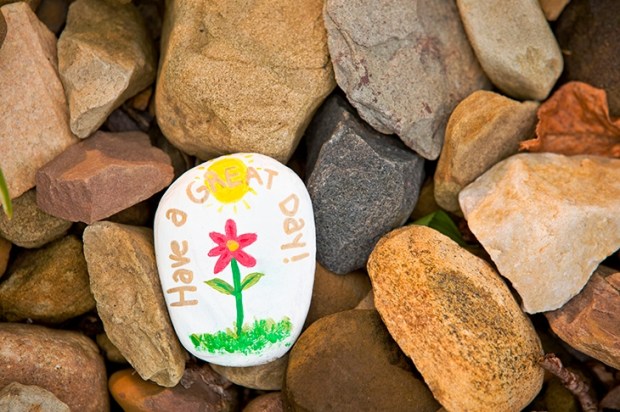Listen
The chances are that by now either you or someone you know well has begun to practise ‘mindfulness’ — a form of Buddhism lite, that focuses on meditation and ‘being in the now’. In the past year or so it’s gone from being an eccentric but harmless hobby practised by contemporary hippies to a new and wildly popular pseudo–religion; a religion tailor-made for the secular West.
Think how hostile an awful lot of companies are to organised religion; to any talk of ‘faith’. Now consider that in both America and the UK, it’s probably easier to count on your fingers the number of institutions that aren’t engaging in ‘mindfulness’ than those that are; giving ‘mindfulness’ teachers special spaces to have classes and encouraging staff to take part.
The mindful include Google, Kensington and Chelsea council, the European Central Bank and the US Marines. The NHS is funding mindfulness sessions for depression as an alternative to pharmaceutical interventions. There’s an all-party mindfulness group in parliament, which Ruby Wax helped launch. Richard Layard, Britain’s ‘happiness guru’, is all for it. Madeleine Bunting has suggested in the Guardian that it should be mandatory in schools. Indeed, if you find yourself on a train with a fellow traveller gazing at you benevolently, it’s possible that they’re not insane but just radiating mindful compassion.
It’s been touted as a cure for pretty well everything, from depression, stress, anxiety and chronic pain to eczema. And for those who can’t manage the group sessions, there’s a handy app called HeadSpace which enables you to do mindfulness on the go from your smartphone and now offers a bespoke service. The app was invented by Andy Puddicombe, a fortysomething former Buddhist monk with a degree in circus arts. According to the New York Times,‘Puddicombe is doing for meditation what Jamie Oliver has done for food.’ Certainly mindfulness is doing for Puddicombe what food has done for Jamie Oliver, because he’s now worth about £25 million.
So what exactly is mindfulness? On the back of a week of sessions, I can assert with some confidence that it’s about being very much in the present moment. You’re encouraged to become aware of your breathing, your body and your surroundings. Plus you’re meant to view people and things in a compassionate, non-judgmental spirit. Think meditation, think Buddhism, and you’re there, so long as you don’t forget the breathing.
It’s ubiquitous, non-invasive and involves sitting quietly and not judging anyone. Guided, communal meditation, let’s say. Anyway, you may be thinking, what do you actually do when you’re being mindful? What actually happens? Well, normally you sit in a semi-circle in a group — anything from five or so to a couple of dozen of you, though some sessions led by the gurus of the movement can muster hundreds. It’ll be a nice quiet place, possibly with candles. Most sessions start off with an exploration of how stressed we all are. The teacher fills a chart with examples — your Tube journey? Your week at work? — and invites participants to stick up their hands if they’re stressed. Everyone does. Then there may be a bit of neurology with diagrams on the chart, showing how we’re all using the fight-or-flight bit of our brain inappropriately, as opposed to the new neurological pathways we can make by reprogramming our brains to chill out through meditation. Then there’s the conscious breathing. It may be preceded by contemplating a leaf or a glass of water before you start focusing on your breath coming in and going out. At which point, as Dorothy Parker would say, you find me and Morpheus in the corner, necking. But the routine varies. At one session, one girl, invited to imagine herself as a tree, plaintively cried: ‘Please can I not be a tree? I was dreading on the way here that I’d have to be a tree.’
Then we share our experiences. Finally we get round to compassion. In one slightly unsettling session, we were invited to pick a person to project compassion at. I selected the Turkish lady opposite; she looked a little uneasy. At another class we were invited to recite: ‘May I/you be well; be happy; be free from suffering’ — and we concluded by saying it for someone we dislike. I would have been fine, in a love-your-enemy way, if the teacher hadn’t declared that the person she really hated was Chris Grayling, the Justice Secretary. Which was a bit rich in a practice meant to teach you to go easy on judgmentalism.
That’s the format, then, and the heart of it is sitting in silence, thinking about your breath going in and out. I must say I’m not very good at this sort of thing. I’m the most judgmental person I know. My mind hops about like a flea. I dropped off during every single one of my mindful breathing sessions. But that’s fine; apparently it just shows how tired we all are. As for the distracting thoughts, they’re fine too, so long as you let them go, possibly like little clouds.
And for some people, all this is to the good. It makes them less stressed, more usefully focused on the here and now. Dr Anthony Seldon has made mindfulness part of the way of life at Wellington College, where he is headmaster. ‘Properly done,’ he observes, ‘it’s the opposite of mindlessness. It helps people to be self-aware, to collect themselves, to be thoughtful before they decide what to do.’ So obviously handy during exams, though he says the benefits go way beyond that.
The evidence seems strong that mindfulness helps with depression, although some dissident psychiatrists suggest the method-ology behind the positive studies hasn’t been as rigorous as it might be. ‘Many of the studies are small, are pilot studies and are carried on those who are not very ill,’ says Professor Patricia Casey of University College Dublin. ‘So they would be at the mild end of the spectrum. Studies have not sufficiently frequently investigated how mindfulness compares with other therapies including pharmacological interventions. Neither have researchers paid much attention to what the active ingredient is — is it being looked after, or looking after oneself?’
I would suggest also that if mindfulness helps with mental health, then let’s not forget that so does organised religion. This ‘active ingredient’ isn’t some new miracle cure: it’s the same grounding effect that Christianity has, or Judaism, or any prayerful religion. We’ve all, over the years, seen studies show that religious people are happier, and that both meditation and prayer are beneficial to the brain. Mindfulness can join the queue. Seldon’s 21st-century boys may find it beneficial to meditate, but their 20th-century counterparts may have found it just as calming to sit in the chapel for morning prayers and just as bonding to sing hymns together. Mind you, at Wellington, they do both.
One of the difficulties mindfulness will face as it sweeps across the globe is that it quite clearly in fact is a religion, however much it might shy away from the word. It’s remarkable the number of classes advertised with the caveat ‘No religious content’, which of course makes it palatable to the growing number who shy away from religion. It’s ritual for those who don’t pray; communal practice for the individualist. It’s non–doctrinal, non-prescriptive, non-demanding in terms of conduct apart from an insistence on not being judgmental. It seems to be the perfect religion for a Britain which is in full flight from its state church. Most other religion substitutes — the Sunday Assembly gatherings for atheists, for example, which Andrew Watts wrote about in this magazine back in February — are self-consciously modelled on Christian services. But mindfulness is squarely based on Buddhism. In fact, from the focus on breathing to the insistence on compassion, it really is Buddhism. At one interesting class I attended in a Buddhist temple — gold images galore — the teacher declared cheerfully that this mindfulness session was going to be a cut above the rest because it got you to the fons et origo of the thing, viz. Buddhist teaching.
Taking an established religion — Buddhism in this case — and picking bits from it piecemeal can be a more dangerous business than it might seem. However much people may dislike the idea, the major world religions have developed incrementally over time to be a comfort and support for humans in their quest for meaning. Even the seemingly eccentric bits can serve a vital purpose, hidden from non-believers. One rejects ‘the boring bits’ of an established religion at one’s peril. Mindfulness, based as it is on meditation, is not simply a path that leads nowhere in particular. It can lead you to that dangerous place, the heart of yourself. And there you may find a great, scary emptiness, or worse, your own personal demons.
Not everyone is strong enough to confront their inner self: in that case, meditation can be an affliction, not a therapy. That phenomenon is being studied at the so-called ‘Dark Night Project’ at Brown University Medical School, where Dr Willoughby Britton deals with the psychic disturbance that meditation can sometimes cause. And that’s of a piece with Buddhist as well as Christian understanding of contemplation; that you can undergo what St John of the Cross called the Dark Night of the Soul. The contemplative life, in Christianity, isn’t for everyone. It is understood that only a few, those with a vocation for it, have the strength to take it on.
There are other aspects of mindfulness which strike me as problematic, not to say unchristian. An important element of the practice is to eschew judgmentalism; to observe and accept ourselves and our surroundings with compassion. Which sounds dandy, except that there are some things about ourselves and our situation which we jolly well shouldn’t be non-judgmental about, which we should be trying to change. One of the best things about the collective culture is that we have a strong moral sense; we consider selfish behaviour unacceptable and hold others to account. Where Buddhism causes us to go within ourselves, to meditate inwardly, Christianity takes you out of yourself — to God and from there to others. Would a ‘mindful’ Britain have the same emphasis on helping others?
This brings me to what really annoys me about being mindful, which is that as far as I can gather, it’s Mostly About Me. Sitting concentrating on your breathing is a good way to chill out and de-stress, but it’s not a particularly good end in itself. Radiating compassion is fine, but it doesn’t obviously translate into action. Where’s the bit about feeding the hungry, visiting the prisoner, all the virtues that Christianity extols? Where in fact is your neighbour in this practice of self-obsession? Given a toss up between going to church, where you rub shoulders with the old, the lonely, the poor, and anyone who cares to pitch up, and a mindfulness session where, for about 25 quid a pop, you can mingle silently with congenial souls in flight from stress, I know which seems more good and human to me. Mindfulness may be the new religion — but it’s no substitute for the old one.
Got something to add? Join the discussion and comment below.
Get 10 issues for just $10
Subscribe to The Spectator Australia today for the next 10 magazine issues, plus full online access, for just $10.
You might disagree with half of it, but you’ll enjoy reading all of it. Try your first month for free, then just $2 a week for the remainder of your first year.














Comments
Don't miss out
Join the conversation with other Spectator Australia readers. Subscribe to leave a comment.
SUBSCRIBEAlready a subscriber? Log in